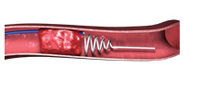
July 21, 2011 – Concentric Medical Inc. announced the launch of the expanded family of Merci Retrievers in Japan for the treatment of ischemic stroke. With the addition of the V 2.0 Soft and V 3.0 Soft, through recent Ichihen Approval, the entire family of V Series Merci Retrievers are now approved and reimbursed in Japan. The Merci Retriever is a catheter-based medical device that stroke centers use to remove blood clots from the brains of patients suffering an ischemic stroke.
Century Medical Inc. of Japan is Concentric Medical's exclusive distribution partner. Together, the two companies have focused on physician training, post-market surveillance and expanded product offerings to support the first-to-market mechanical thrombectomy device for acute ischemic stroke in Japan.
Nobuyuki Sakai, M.D., D.M.Sc., director, Neurosurgery and Stroke Center at Kobe General Hospital, said, "Our treatment for stroke has dramatically changed since the approval of the first Merci Retriever in 2010. Our experience with the Merci Retriever has resulted in high revascularization rates and improved patient outcomes. The recent approval of the V 2.0 Soft and the V 3.0 Soft is valuable for us and I believe these devices will contribute to our improved clinical results."
Yuji Matsumaru, M.D., Ph.D., director, department of endovascular neurosurgery at Toranomon Hospital said, "In Japan, the Merci Retriever is the first and only device for acute endovascular revascularization. Since the reimbursement approval in October 2010, many patients have been treated with this device and the initial results are very promising. Japanese physicians, including myself, welcome the addition of the V 2.0 Soft and V 3.0 Soft to the family of Merci Retrievers currently available. Due to the smaller nature of Japanese patients' vessels, I anticipate frequent use of the V 2.0 Soft to treat occlusions in these smaller, more distal vessels."
Shinichi Yoshimura, M.D., Ph.D., associate professor and clinical professor, department of neurosurgery at Gifu University said, "The introduction of the Merci Retriever has had a great impact on treating acute stroke patients in Japan. For example, our institution's revascularization rate of the internal carotid artery, which is known as the most difficult vessel to reopen, has increased from 48 percent to 75 percent with the introduction of the Merci Retriever. We anticipate the addition of two new Merci Retrievers, the V 2.0 Soft and V 3.0 Soft, will further improve clinical results.”
For more information: www.concentric-medical.com


 February 02, 2026
February 02, 2026 









